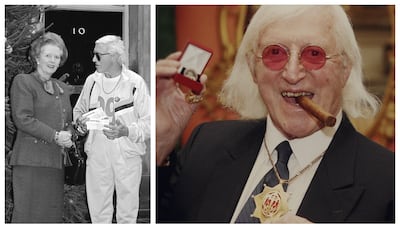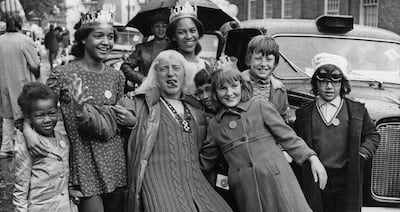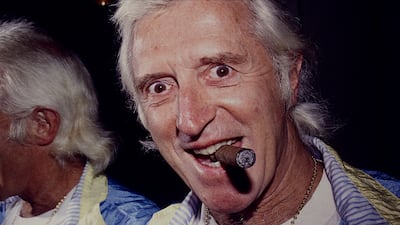Jimmy Savile’s appeal and hold over the British public for so many decades might be difficult for modern audiences to comprehend.
Netflix's excellent two-part documentary on the English DJ, television and radio personality, Jimmy Savile: A British Horror Story, works hard to overcome this "foreign country" of the past, drawing on an archive of vintage footage to immerse the viewer in the Britain of the 1960s, 1970s and 1980s. In particular, that British working-class desire to see “one of their own” make it to the top in a deeply class-ridden society, at a time when upward mobility seemed an impossibility.
Savile, the youngest of seven children, raised in a deprived area of Leeds in northern England on a diet of strict Catholicism and matriarchal worship, would be the man to break through that opaquest of ceilings, largely because, as the documentary astutely notes: “He didn’t wear a suit and he wasn’t posh like the other broadcasters. He was a working-class northerner and former miner.”
Later, viewers will ask themselves how a man with no medical or psychology training or qualifications could be given unrestricted access to the most vulnerable patients at both Leeds General Infirmary and Stoke Mandeville hospitals.
How could he have been appointed chair of a task force overseeing the management of Broadmoor Hospital, England’s oldest and most notorious high-security psychiatric hospital.
How, by 1990, this serial abuser had unfettered and unquestioned access to more than 50 hospitals across the UK.
‘He knew that fame brought power’

Savile’s self-aggrandizing approach to fame took him to the highest echelons of British society, rubbing shoulders with Prince Philip, Princess Diana, Prince Charles, and Margaret Thatcher — the last two would become his close personal friends and confidants.
“He’s very, very intuitive, he understood everyone,” says Tina Davey, a former BBC secretary. “He was a very, very clever man. He knew that fame brought power. His level of fame gave him every door open.”
It was his decision to raise $10 million for NHS hospital Stoke Mandeville that cemented Savile’s place as national treasure.
Britain rallied behind him to donate, and the Savile embarked on a series of nationwide runs, bike rides and fundraising events. Basking in the awe and adoration of the public and royals, it was only a matter of time before he was admitted to the British establishment.
“It’s an invisible club that once you become an established member of, offers a degree of protection and sympathy not afforded to the average person in the street,” notes writer Dominic Carman.
He became “an unofficial advisor to the Prince of Wales”, according to Savile’s official biographer Alison Bellamy, who continues to opt for the cushion of disbelief concerning the DJ’s crimes.
Charles would send Savile drafts of speeches he was due to make, asking him to “cast his eye over” them. Becoming the Prince’s “man of the people”, says Bellamy, “through who Charles found his link with the people of Britain.”
Making his leap from OBE to knighthood at the repeated insistence of Thatcher was a matter of time.
Friendships with police
Part two of the documentary shines an unforgiving spotlight on the blind eyes turned by the British government, the BBC, West Yorkshire Police and the Metropolitan Police.
Senior officers in the West Yorkshire Police were close friends with Savile, visiting him every week as part of his “Friday Morning Club”. So, when a letter that stated of Savile: “Did you know he is a deeply committed paedophile?” was given to them, it simply disappeared.
Meirion Jones, the investigative journalist, whose Newsnight expose of Savile’s abuse was dropped in the wake of the paedophile’s death, reveals a BBC editor pulled the plug because “our sources so far are just the women”.
“Instead, the BBC broadcast wall-to-wall Jimmy Savile tributes,” says Jones. “It made me sick to the stomach.”
‘I’ve got the freedom to do pretty much anything, now’

Of Savile’s estimated 400+ victims — mostly minors and young girls, the youngest being 5 — who he molested, abused and raped during a five-decade-long reign of terror, one Sam Brown finds the courage to speak on-camera.
“I never told anybody anything, I kept all of that to myself,” she says.
“I would argue to myself that I was disgusting, I was horrible. As a 50-year-old woman, I still believe I played a part… That was my fault.”
Ultimately, when confronted with his crimes, Savile publicly revels in them.
“What I’m up to is not getting caught” he says frequently. Stating at other times: “I’m feared in every girls’ school in this country”; “When I’m 65, I’m looking to be a caretaker at a girls’ school”; “We kidnap local ladies and sell them”; “I’ve got the freedom to do pretty much anything, now”…
Savile’s relentless, public proclamations, announced to guffawing interviewers and clapping studio audiences, mocked his victims with his untouchability and paint a disturbing picture of a man who took pride in what he had done. Watching the documentary leaves a lingering distaste and dissatisfaction with the fact that he died before he could be brought to justice.
“I never thought that I was clever,” he says. “Tricky, yes. I’m a very tricky fella. If you are clever, you can slip up. You never slip up if you’re tricky.”
Or, as it transpired, if you’re protected.

